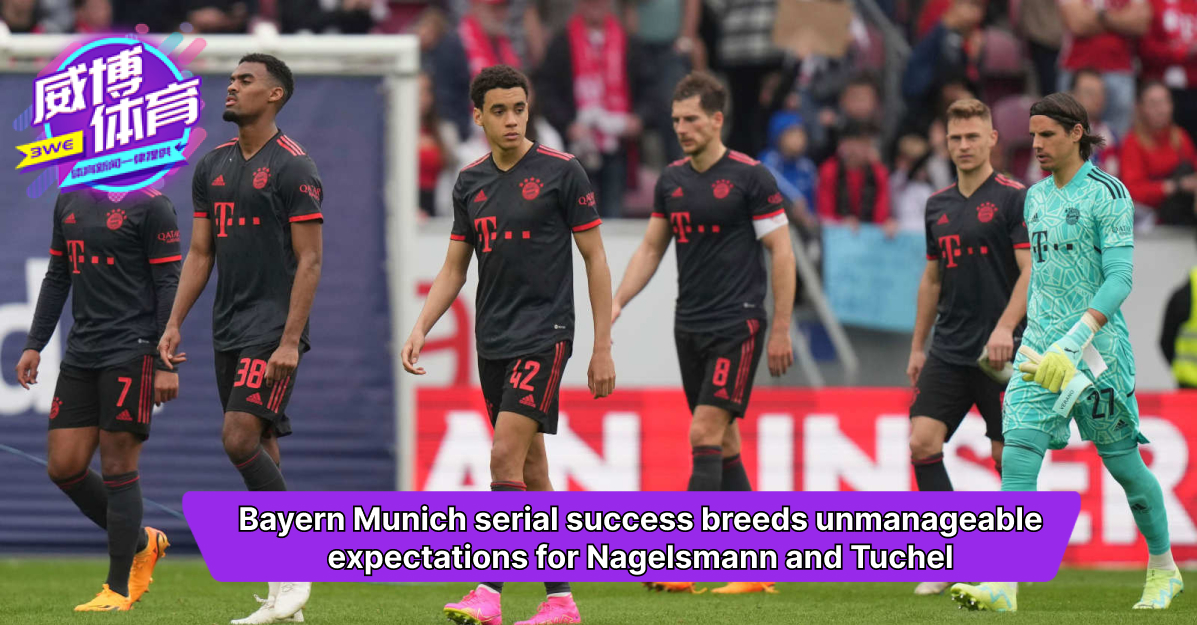Bayern Munich serial success breeds unmanageable expectations for Nagelsmann and Tuchel

It says something about the self-image of Bayern Munich after ten consecutive Bundesliga titles that slipping from the top of the table must have felt like the sky caving in.
It could and perhaps should have happened earlier. Last week they were held at home by Hoffenheim, and when Borussia Dortmund took the lead away to Stuttgart two minutes into stoppage-time, it looked as though this would be enough to knock FC Hollywood from the top of the table. Instead, and some might add in true Borussia Dortmund style, Stuttgart equalised in the seventh minute of stoppage-time, leaving things very much as they were by the end of the afternoon.
Having survived that weekend, Bayern’s performance at Mainz on Saturday was problematic. They took a first-half lead, but this was their only shot on target of the opening 45 minutes and Mainz’s comeback – their third consecutive late April league win against the perennial champions – was thoroughly deserved as Bayern wilted in the second half, conceding three goals in 14 minutes.
And this time they couldn’t rely on Dortmund doing Dortmund things to keep themselves at the Bundesliga summit; a 4-0 win against Eintracht Frankfurt put them top of the table by a point with five games left to play.
This will obviously draw attention towards new head coach Thomas Tuchel, for whom this was a third defeat since taking charge of the club a month ago. Over the course of that month, Bayern have been eliminated from the DFB-Pokal at the quarter-final stages after losing 2-0 to RB Leipzig, surrendered tamely to Manchester City in the quarter-finals of the Champions League, and have now been knocked off the top of the Bundesliga league table too. But for all this, it is clear that any malaise within the club runs deeper than merely the head coach.
The decision to sack Julian Nagelsmann in the first place was certainly a surprise. After all, while the team’s formed had dipped since returning from the World Cup, they’d only spent one week away from the top of the table since the end of October, and while their toothless defeat to Manchester City might have been a harsh reminder of where purchasing power truly rests within European club football nowadays, this can’t be laid at his door – he’d already gone by then – while his last result in the Champions League had been an extremely controlled 3-0 aggregate win against PSG in the previous round.
Nagelsmann had only recently been described as a “perfect fit” by club chairman Herbert Hainer. The decision felt like a panic, jettisoning a long-term plan in favour of that familiar short-term craving for silverware.
The fact that matters have deteriorated (further) since his departure hints at the extent to which the club’s woes reach somewhat deeper than just the head coach. Transfer policy has been muddled for some time. Last summer the club sold their most dependable source of goals, Robert Lewandowski, to Barcelona and while his replacement Sadio Mane may have scored his team’s only goal at Mainz, this was only his seventh league goal of the season and his first since the end of October.
To be clear, scoring goals hasn’t really been Bayern’s biggest issue on the field this season. After all, they’ve score four goals or more in eight different league matches this season and their 79 league goals in 29 games is 13 more than Borussia Dortmund, whose 66 goals are themselves 13 clear of third place.
But as ever in Germany, a narrative of ‘failure’ on the pitch has led to increasing scrutiny of the roles of others within the club, and chief in the firing line is club CEO Oliver Kahn, who had previously told Sky Germany that the circumstances of Nagelsmann’s departure was a “disaster” after news of his imminent sacking was leaked to the press. Nagelsmann’s management agency, Sports 360, revealed that they had to contact Bayern sporting director Hasan Salihamidzic after reading reports of their client’s imminent departure from the club. Neither Kahn or Salihamidzic seem particularly popular among the club’s support.
Supporters of the other 99.99999% of football clubs in the world can easily be forgiven for rolling their eyes at this being described as any sort of meaningful ‘crisis’. After all, in the entire history of European club football only five clubs – Dinamo Zagreb of Croatia, Rosenborg of Norway, BATE Borisov of Belarus, Skonto Riga of Latvia and Lincoln Red Imps of Gibraltar – have ever won more than ten successive domestic league titles.
But success can be a double-edged sword. It breeds greater expectation, and at a club like Bayern Munich, 32 times champions of Germany and six times champions of Europe, that expectation level now seems to have reached a new peak at which no level of failure to relentlessly win football match after football match will or even can be tolerated.
If that sounds a touch hyperbolic, the evidence is right in front of our very eyes. Julian Nagelsmann was sacked after their third league defeat of the season, each of which came by a one-goal margin. In Europe’s ‘Big Five’ leagues, only Arsenal and Napoli have lost as few as three games this season, while Barcelona have only lost two.
Amongst the other clubs that have now lost four league games this season are Manchester City, and even when they were having their blip in the league there was obviously no talk of replacing Pep Guardiola, while Real Madrid have lost five league games. Is the level of expectation now so high that they are required to win the Bundesliga every year until the end of time? Is that healthy?
It’s only taken a month for the decision to sack Julian Nagelsmann to start looking like an error of judgement. This isn’t on Thomas Tuchel, of course. If Bayern have been slipping from their lofty perch, that process started long before he arrived at the club. The altercation between Mane and Leroy Sane following their loss at Manchester City, for example, now feels a sign of discontent that was already bubbling away under the surface behind the scenes at the Allianz Arena.
Perhaps it might even do Bayern Munich some good to miss out on the Bundesliga title this season. A reset of those wild expectation levels would likely do the mental health of everybody at the club some degree of good. It would certainly be good for the rest of German football, and ten consecutive league titles doesn’t even seem to have made Bayern Munich very happy.






